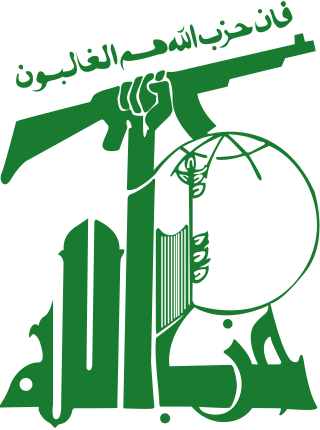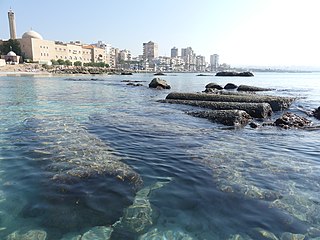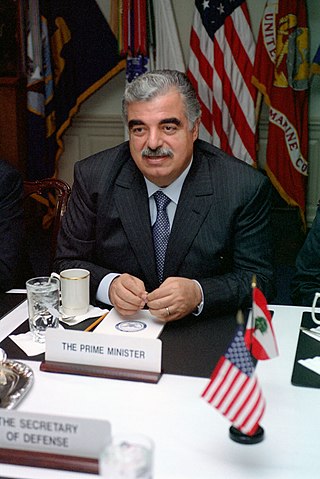Related Research Articles

Hezbollah is a Lebanese Shia Islamist political party and militant group, led by its Secretary-General Hassan Nasrallah since 1992. Hezbollah's paramilitary wing is the Jihad Council, and its political wing is the Loyalty to the Resistance Bloc party in the Lebanese Parliament.

Lebanon, officially the Republic of Lebanon or the Lebanese Republic, is a country in Western Asia. It is located between Syria to the north and east and Israel to the south, while Cyprus lies to its west across the Mediterranean Sea; its location at the crossroads of the Mediterranean Basin and the Arabian hinterland has contributed to its rich history and shaped a cultural identity of religious diversity. It is part of the Levant region of the Middle East. Lebanon is home to roughly five million people and covers an area of 10,452 square kilometres (4,036 sq mi), making it the second smallest country in continental Asia. The official language of the state is Arabic, while French is also formally recognized; Lebanese Arabic is used alongside Modern Standard Arabic throughout the country.

The history of Lebanon covers the history of the modern Republic of Lebanon and the earlier emergence of Greater Lebanon under the French Mandate for Syria and the Lebanon, as well as the previous history of the region, covered by the modern state.

Tyre is a city in Lebanon, one of the oldest continually inhabited cities in the world, though in medieval times for some centuries by just a tiny population. It was one of the earliest Phoenician metropolises and the legendary birthplace of Europa, her brothers Cadmus and Phoenix, as well as Carthage's founder Dido (Elissa). The city has many ancient sites, including the Tyre Hippodrome, and was added as a whole to UNESCO's list of World Heritage Sites in 1984. The historian Ernest Renan noted that "One can call Tyre a city of ruins, built out of ruins".

Beirut is the capital and largest city of Lebanon. As of 2014, Greater Beirut has a population of 2.5 million, which makes it the third-largest city in the Levant region. The city is situated on a peninsula at the midpoint of Lebanon's Mediterranean coast. Beirut has been inhabited for more than 5,000 years, and was one of Phoenicia's most prominent city states, making it one of the oldest cities in the world. The first historical mention of Beirut is found in the Amarna letters from the New Kingdom of Egypt, which date to the 14th century BC.

The 1982 Lebanon War, dubbed Operation Peace for Galilee by the Israeli government, later known in Israel as the Lebanon War or the First Lebanon War, and known in Lebanon as "the invasion", began on 6 June 1982, when the Israel Defense Forces (IDF) invaded southern Lebanon. The invasion followed a series of attacks and counter-attacks between the Palestine Liberation Organization (PLO) operating in southern Lebanon and the IDF that had caused civilian casualties on both sides of the border. The military operation was launched after gunmen from Abu Nidal's organization attempted to assassinate Shlomo Argov, Israel's ambassador to the United Kingdom. Israeli Prime Minister Menachem Begin blamed Abu Nidal's enemy, the PLO, for the incident, and used the incident as a casus belli for the invasion.

The Lebanese Civil War was a multifaceted armed conflict that took place from 1975 to 1990. It resulted in an estimated 120,000 fatalities and an exodus of almost one million people from Lebanon.

Hassan Nasrallah (Arabic: حسن نصر الله [ħasan nasˤrɑɫɫɑh]; born 31 August 1960) is a Lebanese cleric and political leader who has served as the 3rd secretary-general of Hezbollah since his predecessor, Abbas al-Musawi, was assassinated by the Israel Defense Forces in February 1992.

Rafic Bahaa El Deen Al Hariri was a Lebanese business tycoon and politician, who served as the Prime Minister of Lebanon from 1992 to 1998 and again from 2000 until his resignation on 20 October 2004.

The Prime Minister of Lebanon, officially the President of the Council of Ministers, is the head of government and the head of the Council of Ministers of Lebanon. The Prime Minister is appointed by the president of Lebanon, with the consent of the plurality of the members of the Parliament of Lebanon. By convention, the office holder is always a Sunni Muslim.

Michel Naim Aoun is a Lebanese politician and former military general who served as the President of Lebanon from 31 October 2016 until 30 October 2022.

Saad El-Din Rafik Al-Hariri is a Lebanese-Saudi politician who served as the prime minister of Lebanon from 2009 to 2011 and 2016 to 2020. The son of Rafic Hariri, he founded and has been leading the Future Movement party since 2007. He is seen as "the strongest figurehead" of the March 14 Alliance.

The President of the Lebanese Republic is the head of state of Lebanon. The president is elected by the parliament for a term of six years, which cannot be renewed immediately because they can only be renewed non-consecutively. By convention, the president is always a Maronite Christian who fulfills the same requirements as a candidate for the house of representatives, as per article 49 of the Lebanese constitution.

The Lebanese Forces is a Lebanese Christian-based political party and former militia during the Lebanese Civil War. It currently holds 19 of the 128 seats in Lebanon's parliament and is therefore the largest party in parliament.

The 2006 Lebanon War, also called the 2006 Israel–Hezbollah War and known in Lebanon as the July War and in Israel as the Second Lebanon War, was a 34-day military conflict in Lebanon, Northern Israel and the Golan Heights. The principal parties were Hezbollah paramilitary forces and the Israel Defense Forces (IDF). The conflict started on 12 July 2006, and continued until a United Nations-brokered ceasefire went into effect in the morning on 14 August 2006, though it formally ended on 8 September 2006 when Israel lifted its naval blockade of Lebanon. Due to unprecedented Iranian military support to Hezbollah before and during the war, some consider it the first round of the Iran–Israel proxy conflict, rather than a continuation of the Arab–Israeli conflict.

The Maronites are a Christian ethnoreligious group native to the Eastern Mediterranean and Levant region of the Middle East, whose members traditionally belong to the Maronite Church, with the largest concentration long residing near Mount Lebanon in modern Lebanon. The Maronite Church is an Eastern Catholic sui iuris particular church in full communion with the Pope and the rest of the Catholic Church, whose membership also includes non-ethnic Maronites.

Bachir Pierre Gemayel was a Lebanese militia commander who led the Lebanese Forces, the military wing of the Kataeb Party in the Lebanese Civil War and was elected President of Lebanon in 1982.

Najib Azmi Mikati is a Lebanese politician and businessman, and three-time Prime Minister of Lebanon whose current term began in September 2021. He also serves as the resigned prime minister of a cabinet that when assembled with a majority of its members acts as President of Lebanon for emergency situations, and this since the end of the term of president Michel Aoun as of October 2022. He previously served as Prime Minister from June 2011 to February 2014 and from April to July 2005. He also served as Minister of Public Works and Transport from December 1998 to 2003.

On 4 August 2020, a large amount of ammonium nitrate stored at the Port of Beirut in the capital city of Lebanon exploded, causing at least 218 deaths, 7,000 injuries, and US$15 billion in property damage, as well as leaving an estimated 300,000 people homeless. A cargo of 2,750 tonnes of the substance had been stored in a warehouse without proper safety measures for the previous six years after having been confiscated by the Lebanese authorities from the abandoned ship MV Rhosus. The explosion was preceded by a fire in the same warehouse.
Hamad Ali Hasan is a Lebanese academic and politician who has served as the Minister of Health in the Lebanese government from 21 January 2020 to 10 September 2021.
References
- 1 2 3 4 سليم سعادة Archived 2019-02-17 at the Wayback Machine . Annahar